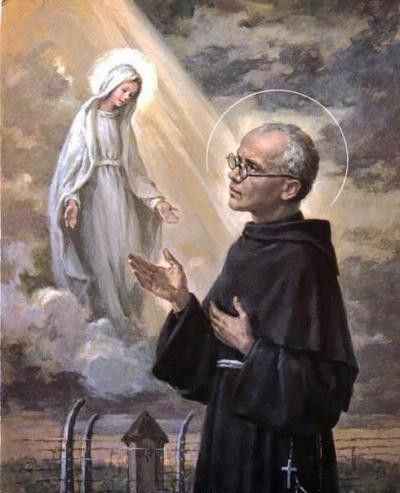
Saint of the Day for 14 August: St Maximilian Mary Kolbe
Infinite love at the heart of the holocaust
Name
Rajmund Kolbe
Title
Priest and martyr
Birth
08 January 1894, Poland
Death
14 August 1941, Auschwitz Concentration Camp, Poland
Recurrence
14 August
Martyrology
2004 edition
Beatification
17 October 1971, Rome, Pope Paul VI
Canonisation
10 October 1982, Rome, Pope John Paul II
Prayer
O God, who gave to the Church and to the world St. Maximilian Mary Kolbe, priest and martyr, burning with love for the Immaculate Virgin, entirely dedicated to the apostolic mission and to the heroic service of our neighbour, through his intercession grant us also, for the glory of Thy Name, to commit ourselves unreservedly to the good of humanity to imitate, during our life and at the hour of death, Christ Thy Son.
Protector of
amateur radio
Roman Martyrology
Memory of St Maximilian Mary (Raymond) Kolbe, priest of the Order of Friars Minor Conventual and martyr, who, founder of the Militia of Mary Immaculate, was deported to various places of captivity and, finally arriving at the Auschwitz extermination camp near Krakow in Poland, surrendered himself to the executioners in place of a fellow prisoner, offering his ministry as a holocaust of charity and a model of fidelity to God and man.
The Saint and Mission
St. Maximilian Mary Kolbe, a 20th-century Polish Franciscan friar, is known for his total dedication to the Christian mission of love and sacrifice, culminating in his heroic act of giving his own life to save another man’s in the Auschwitz concentration camp.
Before he was captured by the Nazis, Kolbe had dedicated his life to evangelical mission through the Catholic press and spreading the cult of the Immaculate Conception. He founded two communities, called “Cities of the Immaculate,” in Poland and Japan, where Franciscan friars worked to print Catholic periodicals and books, reaching millions of people around the world.
Kolbe’s mission went to the heart of the Gospel: to love God and to love one’s neighbor as oneself. This mission became embodied in his final act of charity at Auschwitz, when he volunteered his life to save a family man who had been sentenced to death.
Kolbe lived his Christian vocation as a total commitment, from which flowed an unreserved evangelical and humanitarian mission. His example shows how Christian mission is not just a matter of words or ideas, but of concrete and often sacrificial actions.
In the life and death of St. Maximilian Mary Kolbe, we see the essence of Christian mission: a love that does not spare itself, that gives itself completely for the sake of others, in the image of Christ’s sacrificial love. Kolbe reminds us that Christian mission is always a commitment of love and sacrifice, a duty of mercy and service to others, even to the point of giving one’s life.
The Saint and Mercy
Saint Maximilian Mary Kolbe is a figure of exceptional witness of mercy and sacrifice in the merciless and inhuman context of the Holocaust. Known for voluntarily offering his life to save that of a family man in the Auschwitz concentration camp, Kolbe has become a universal symbol of selfless love and divine mercy.
His action was not a sudden gesture, but the culmination of a life dedicated to the love of God and neighbour. Before his internment, Kolbe was a Franciscan, founder of the Immaculate Conception movement, whose goal was the conversion of the world through the intercession of the Virgin Mary.
Mercy, in Kolbe’s action, is manifested as the greatest love: the offering of one’s life for others. This gesture of extreme charity is a reflection of the mercy of God, who gives himself totally for the salvation of humanity. Kolbe, with his death, becomes an icon of divine mercy, showing how far love for neighbour can go.
His testimony remains a powerful warning against indifference and hatred. Kolbe’s action, in the middle of the night of the Holocaust, becomes a beacon of hope and mercy, illuminating the possibility of love even in the most desperate circumstances.
The life and death of St Maximilian Mary Kolbe are a hymn to mercy, reminding us that selfless love is the highest expression of our humanity and the most authentic manifestation of God’s love.
Hagiography
Father Kolbe is the heroic Conventual Franciscan friar who in the Auschwitz concentration camp offered his life to save that of a family man, Francis Gaiowniczek, condemned to die of starvation in retaliation for the escape of a prisoner.
John Paul II, in raising him to the honours of the altars on 10 October 1982, proclaimed him ‘patron saint of our difficult century’, an example of peace and…
